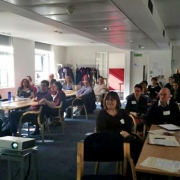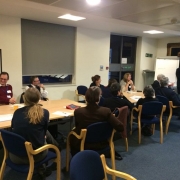Summary
At an earlier meeting, a plea was made to examine the way professional development (and, indirectly, training) is managed for knowledge and information managers. This meeting therefore examined possible approaches to such professional development.
A year previously, NetIKX, with the cooperation of a number of other organisations in the field of knowledge and information management, ran a meeting called Connecting Knowledge Communities, at which representatives of these organisations, as well as NetIKX itself, talked about their membership, their focus and their mode of operation.
The organisations were: Henley Forum for Organisational Learning & Knowledge Strategies, the Knowledge and Innovation Network (KIN), IRMS (the Information and Records Management Society), ISKO UK (the UK Chapter of the International Society for Knowledge Organization) and KIDMM (the Knowledge, Information, Data and Metadata Management online forum). This meeting was intended to take that relationship one stage further by examining an area that is likely to be of interest to all these groups.
Luke Stevens-Burt, talked about CPD at CILIP and the PKSB (Professional Knowledge and Skills Base), which can be used to rate knowledge and skills levels and identify areas for improvement. Christopher Reeves and Karen Thwaites from the Department for Education, talked about CPD, particularly focusing on the new Government KIM framework and how it was produced – there was a unique opportunity to see this from the perspective of the Department for Education because Chris did a lot of the coordination to ensure consultation there and experienced the challenges that this raised.
Speakers
Luke Stevens-Burt is currently Head of Business Development (Member Services) at CILIP. His role is focused on delivering value and support to the library and information profession through his overall responsibility for membership development. Primarily, he manages this through CPD activities, Professional Registration, career support services and Member Networks, all of which are central to the CILIP membership offer, something that he is also responsible for shaping over time to meet the wider needs of the profession. Luke also plays a key role in overseeing engagement with employers and employer groups, accreditation of information and library related degree programmes, membership recruitment and retention strategy, and business growth and development.
Christopher Reeves is a Records Manager and Records Reviewer for the Department for Education; his responsibilities include the day to day management of departmental paper records and the appraisal and selection of these records for public access at The National Archives. He is part of the Government Knowledge and Information Management Profession and has recently been involved, as part of a cross-Government working Group, in the review and revamp of the professional skills framework. Chris has a degree in law and is currently taking steps towards his own professional development, through enrolment on the industry recognised Diploma in Records and Information Management.
Karen Thwaites is part of the Knowledge and Information Management (KIM) team in the Department for Education; she has been part of the team since August 2015. Karen helps to manage the Department’s collaborative digital workspace and provides training and support to develop users and administrators in its use. Karen is currently participating in a talent management scheme aimed at improving the prospects of individuals identified as capable of achieving a higher grade.
Time and Venue
2pm on 21 September 2016, The British Dental Association, 64 Wimpole Street, London W1G 8YS
Pre Event Information
Intended Learning Objectives
• To understand the significance of professional development
• To identify alternative approaches to professional development
• To explore ways in which organisations may be able to cooperate in implementing such approaches
Slides
Not available
Tweets
#netikx81
Blog
See our blog report: Connecting Knowledge Communities: Approaches to Professional Development
Study Suggestions
None


